Sitting proudly at 1,075 metres above sea level, Chittorgarh Fort is the highest fort in India, a true symbol of Rajput bravery and resilience. From its grand palaces and intricately carved temples to the towering gates that have witnessed centuries of valour, every corner of the fort tells a tale. As a UNESCO World Heritage Site, it’s a reminder of India’s rich past and enduring spirit. Whether you’re exploring its vast grounds or soaking in the panoramic views, Chittorgarh Fort is a must-visit for anyone eager to experience the heart and soul of Rajasthan’s rich heritage.
History

Built in the 7th century, Chittorgarh fort was the pride of Mewar for over 800 years, witnessing countless battles and legendary stories. Its towering height made it a powerful stronghold, yet it faced intense sieges, including those by Alauddin Khilji in 1303 and Akbar in 1567. Rather than surrender, the Rajputs chose honour, leading to the tragic yet heroic acts of jauhar and saka.
Location
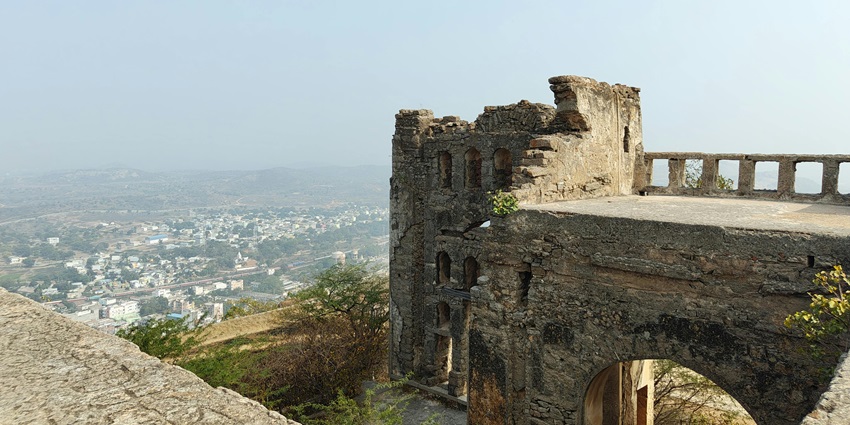
Photo: Jansher Chakkittammal / Pexels
Chittorgarh Fort is in Chittorgarh, southern Rajasthan, perched atop a 180-metre hill, covering 700 acres. Its strategic location was a formidable stronghold. The city lies below, with the fort dominating the skyline. Chittorgarh is 117 km from Udaipur and 315 km from Jaipur. Its elevated position offers stunning views. The fort’s central Rajasthan location makes it an integral part of the state’s cultural and historical richness.
How To Reach
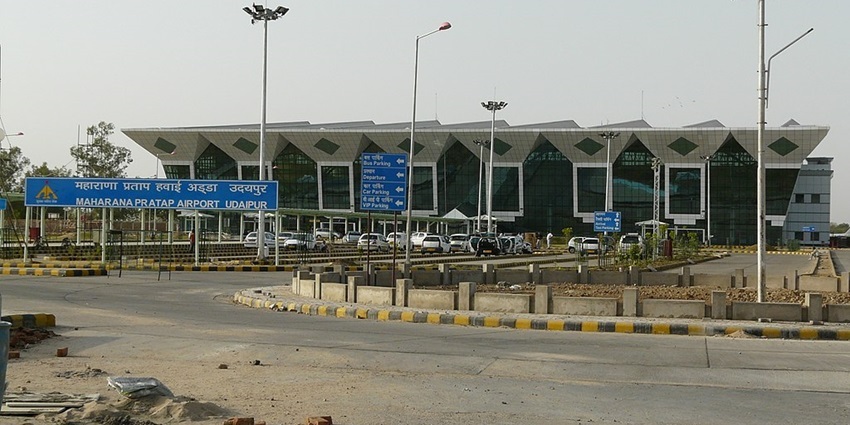
Photo: Northside / Wikimedia Commons
If you are wondering how to reach Chittorgarh fort, it is very convenient to do so, thanks to its well-connected transport options. The city is accessible by road, rail, and air.
By Air: The nearest airport is Maharana Pratap Airport in Udaipur, about 90 – 115 km away. From there, you can hire a taxi or take a bus to Chittorgarh, which takes around 2 hours.
By Train: Chittorgarh is well-linked by rail, with trains connecting it to cities like Udaipur, Jaipur, and Ajmer. You can check and book tickets through IRCTC.
By Road: Regular buses run from major cities like Udaipur and Jaipur.
Places To Visit Around Chittorgarh Fort
Let’s explore the must-visit attractions around Chittorgarh Fort to make your Rajasthan trip even more memorable:
1. Kumbhalgarh Fort
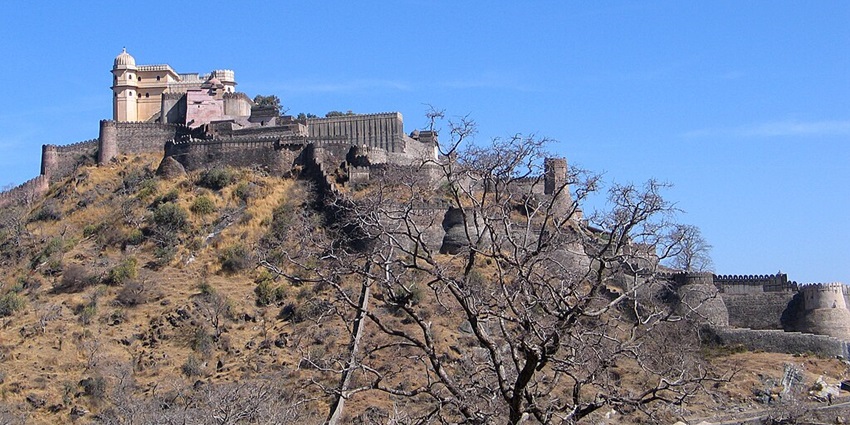
Photo: Shakti / Wikimedia Commons
Located about 85 km from Chittorgarh, Kumbhalgarh Fort is a stunning UNESCO World Heritage Site known for its extraordinary 36 kilometre long walls, one of the longest continuous walls in the world. Built in the 15th century by Rana Kumbha, the fort showcases incredible Rajput architecture and strategic design. Situated in the Aravalli Range, the fort provides beautiful views of the surrounding landscape. The fort is also home to Kumbhalgarh Wildlife Sanctuary.
Timings: 9 AM – 6 PM; Light & Sound Show: 6:45 PM – 7:30 PM
Entry Fee: ₹40 for Indians; ₹600 for foreigners; Light & Sound Show: ₹100
2. Ranakpur Jain Temple
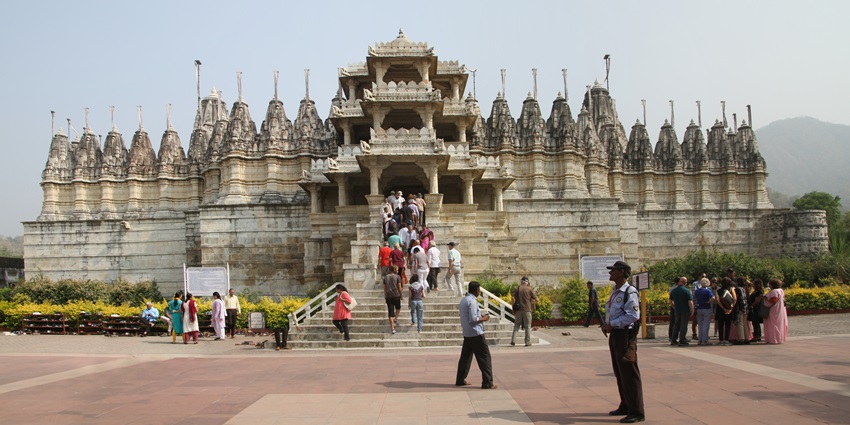
Photo: Gerd Eichmann / Wikimedia Commons
Located about 96 km from Chittorgarh, the Ranakpur Jain Temple is dedicated to Tirthankara Adinatha and boasts over 1,400 intricately carved pillars, each with its own unique design. Built in the 15th century, this temple’s peaceful atmosphere coupled with the structural craftsmanship, makes it a popular destination for both spiritual seekers and architecture enthusiasts. Set against the Aravalli Range, the main temple includes several smaller temples that are worth exploring.
Timings: 6 AM – 8 PM
Entry Fee: Free
3. Rajsamand Lake

Photo: Koustave / Wikimedia Commons
Located around 155 km from Chittorgarh, Rajsamand Lake is an artificial lake created in the 17th century. Known for its serene beauty and historical significance, the lake is surrounded by marble ghats and stunning cenotaphs, making it a peaceful escape. Popular among locals and tourists alike, Rajsamand Lake is ideal for a peaceful picnic, where visitors can enjoy boating on its calm waters. It’s also a fantastic spot for birdwatching, particularly during migratory seasons.
Timings: Open year-round, best visited during daylight hours
Entry Fee: Free
4. Bassi Wildlife Sanctuary
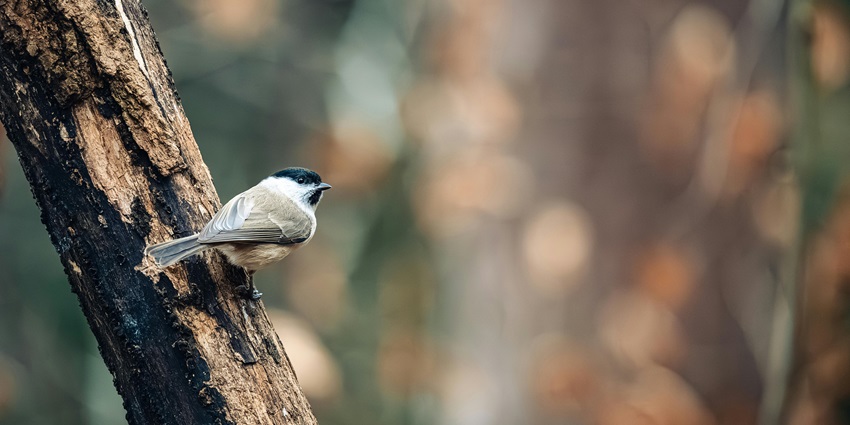
Photo: Matej Bizjak / Pexels / Image For Representation Only
Bassi Wildlife Sanctuary spans 150 square kilometres and is a haven for nature lovers and wildlife enthusiasts. The sanctuary is home to a wide variety of species, including wild boar, jackals, four-horned antelopes, and migratory birds. The dry deciduous forest is rich in diverse flora, featuring trees like Dhok and Butea, as well as medicinal plants. Visitors can embark on thrilling jeep safaris to explore the sanctuary and observe wildlife in their natural habitat.
Timings: Sunrise – Sunset
Entry Fee: Minimal charges may apply
5. Haldighati
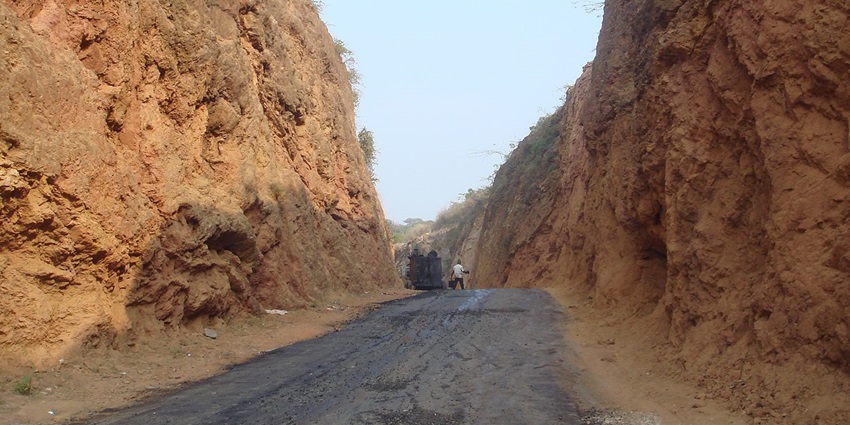
Photo: Soundarya Varadarajan / Wikimedia Commons
Located around 165 km from Chittorgarh, Haldighati is a historic site famous for the epic battle fought in 1576 between Maharana Pratap and Mughal Emperor Akbar. This battlefield is a symbol of Rajput bravery and the fierce resistance of Maharana Pratap against Mughal expansion. The site holds immense historical significance and is a tribute to the valour and determination of the Rajput rulers.
Timings: Open year-round
Entry Fee: Free
Must-Have Experiences
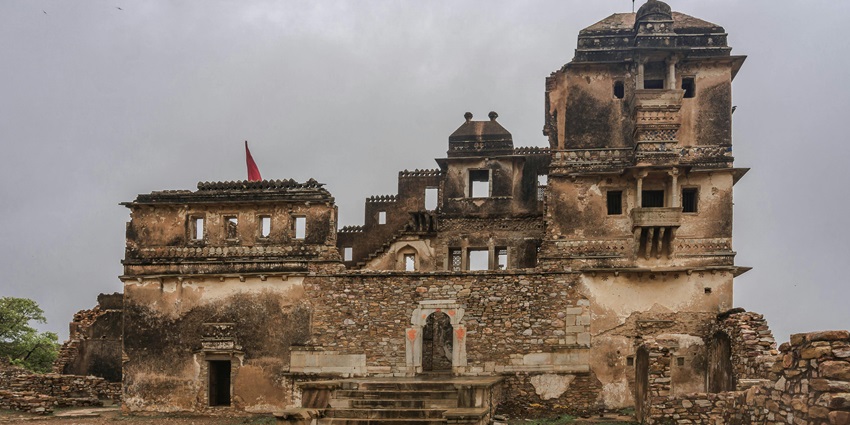
- Walk Through The Seven Majestic Gates – The fort features seven impressive gates and each gate has its own history and significance. These are: Ram Pol, Laxman Pol, Padan Pol, Ganesh Pol, Jodla Pol, Bhairon Pol, and Hanuman Pol.
- Climb The Vijay Stambh / Victory Tower – The effort is worth it! From the top, you’ll get stunning views of the fort and the landscape beyond.
- Explore Padmini’s Palace – Step into history as you hear the tale of Queen Padmavati and her legendary beauty.
- Walk Around The Gaumukh Reservoir – This sacred water tank within the fort is a quiet place to pause and take in the surroundings.
- Experience The Sound And Light Show – In the evening, watch history unfold through a dramatic storytelling experience at the fort. Check Chittorgarh Fort timings beforehand.
Where To Stay

Photo: Pixabay / Pexels / Image For Representation Only
Chittorgarh offers a variety of accommodations to suit different budgets and travel styles. Whether you’re looking for a royal heritage stay or a cosy budget friendly lodge, you’ll find plenty of options. Hotels like Pratap Palace and Mewar Haveli provide warm Rajasthani hospitality with a touch of tradition. For a unique experience, Castle Bijaipur, located about 40 km away, offers a heritage stay.
Where To Eat
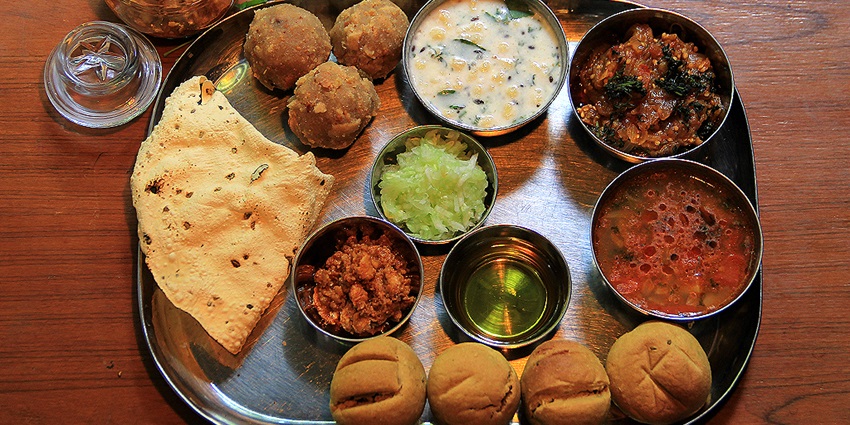
Photo: Niranjan.gohane / Wikimedia Commons
The highest fort in India, Chittorgarh is a treat for food lovers, especially those looking to savour authentic Rajasthani flavours. A must try is the classic Rajasthani thali at Pratap Bhojanalya or Mewar Restaurant, featuring dal baati churma, gatte ki sabzi, and other regional specialties. For a more refined dining experience, heritage hotels like Castle Bijaipur offer a blend of local and international cuisines in a regal setting. And no visit is complete without indulging in mawa kachori, a rich and sweet delicacy.
Best Time To Visit
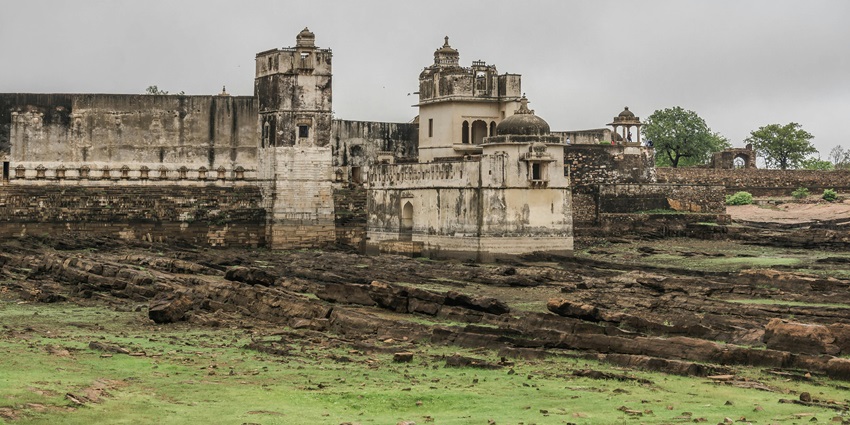
The best time to visit Chittorgarh Fort is between October and March when the weather is most pleasant. With daytime temperatures ranging from 15°C – 30°C, exploring the vast fort complex becomes a comfortable and enjoyable experience. The cool mornings and evenings create the perfect atmosphere for sightseeing, allowing visitors to soak in the fort’s history without the discomfort of Rajasthan’s scorching summer heat.
Other Factors To Consider

Photo: Kelly Sikkema / Unsplash
Average Cost Of Trip
When planning a trip to Chittorgarh Fort, a budget of around ₹2,000 – 3,000 per day should comfortably cover mid-range accommodation, meals, and local transport. The entry fee to the fort is quite affordable, costing ₹40 for Indian visitors and ₹600 for foreigners. If you want to truly immerse yourself in the fort’s history, hiring a guide for ₹850 – 1,250 is highly recommended. In the evening, don’t miss the Sound and Light show, which beautifully narrates the fort’s rich past. The tickets cost ₹50 for adults and ₹25 for children. Overall, The Highest fort in India, Chittorgarh offers a budget-friendly yet deeply enriching experience for history lovers and travellers alike.
Tips For Travellers
- The fort is massive, and you’ll be doing a lot of walking, so comfy footwear is a must.
- Exploring can be tiring, so keep a water bottle and some light snacks handy.
- If you’re visiting during the day, wear sunscreen, sunglasses, and a hat to stay cool.
- Rajasthan has deep-rooted traditions, so covering up when visiting temples is respectful.
- If you’re planning to visit multiple heritage sites, having a Rajasthan tourist pass can save you money and hassle.
A visit to Chittorgarh Fort is a truly remarkable experience, offering a fascinating glimpse into Rajasthan’s history and heritage. From its towering gates and ancient temples to the incredible stories of bravery that echo through its walls, the fort brings the past to life in a way that captivates every visitor. Plan your trip to Chittorgarh, the highest fort in India with TripXL and immerse yourself in the beauty of this iconic landmark.
Cover Photo: Roman Saienko / Pexels


 WhatsApp
WhatsApp
 Twitter
Twitter









